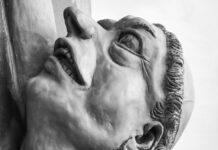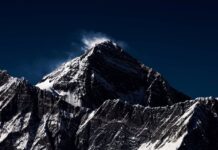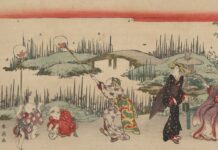Photo by: Sara Marin Amariles
What you are reading is a portion of the journey undertaken by a brother (Ad) and a sister (Soeur) with the sister’s husband (Tush). They are travelling to visit a relative (Beten) who is dying, and who has written to say he must speak to the brother before he dies. The narration progresses the same way they live their lives, exploring their sensations and instincts. Ad (the brother) has an added burden of self-consciousness and self-control, which he comes to think over time changes him from being an animal to being a monster. His sister, Soeur, on the other hand, moves forward into the world and finds it. She narrates this chapter. The complete novella is called CLOSER. Later, we meet other “animals” and “monsters”, and even a “monster-killer”. I wanted the tone of a medieval bestiary. I find that in many ways the so-called third world today, or at least Colombia, is very similar in its belief structures to Europe in the Middle Ages. The confrontation between self-consciousness and the mystery of violence, brought on by nature or perpetrated by other humans, creates extreme, almost visionary responses. ( Foreword by the author )
The air made me weep. I awoke at a mountain’s foot. The cold swept my face. Tush was up and watchful. He was right to think that there were serpents here. I came out of the field of flowers, and around the house, and once again saw how the small valley opened out onto a plain. Tush was quiet and I wept. Something like a metal shield wrinkled up in my chest. I wept and wanted to circle Tush.
Ad appeared saying he had been roused by purple horses. I could not protect anyone and the direction of the plain opened out the sky. The going was about thirty miles, but the coming back was more than forty because of the epidemic. Tush would live to be three hundred or so. Now I wanted to circle Ad, my once brother.
The air cracked. Some children must have climbed up the side of the small grassy valley. The sound of their fireworks rang out over us and came back off the mountain behind us.
Ad climbed up on a stump to try and guess the direction of the sky’s temper. He looked so small there. Had the sounds in the air been gunfire, any one of them could have swept him off that stump. He could not protect anybody from anything.
I watched the wind caress the valley beneath the naked sky, resting my palm on a mound of dirt, a nest of what is blessed underground, hurt, what is sun sundered, left under, soundless, unfound. Rest remains rest, pressed it remains rest, no matter how under, rest remains rest.
Ad stood beneath a cloud of five colors. He was a mix of elements and senses whipping into each other. He stopped being simple when he was still a baby.
Ad’s vest was red and the stump was as brown as rich dirt. The green soaked out around us, a lake of grass sounds. Above the moist brushing, Ad aloft was somehow embedded in the blue of far away things, like an insect to be dug out with a pocket knife, almost flapping his arms, almost twitching or fluttering, gossamer. The air was charged with the distance of the blue around him.
Tush was moving, gathering our things to him. Goodness is like a rolling. He could not protect anybody from a sudden darkness and he knew it. At any moment, the wind might flip the greenest leaf to reveal another page illuminated in its veinworks. So Tush was moving, and my attention flickered toward him. A lamp touches the objects around it gently, and with the moving underness of a wave, Tush was immanent. He did not know what jealousy was. I got up to follow him.
Copper pheasants lit out from the tall grass just ahead. A flame to streak our path and slowly lift.
–Are there ghosts? Ad said, coming back to us and stepping off the stump. Then he said something about an original heart.
The dead dove from our burdened shoulders through and around the house, into the field of irises, into the face of the mountain, and out again, returning to our shoulders with their mouths full of earth. Their long wispy sleeves billowed in the breeze, the breath before a kiss.
I was already walking when I started listening to the murmurs of red butterfly wings around us. I saw Tush look up toward the distance and smile to himself as he carried us with the rhythm of continuing on.
2.
Two nights earlier, the continuing had been more blind. After coming off the lake, we had passed through the dark woods like a whistling. Ad had turned himself into a thrush, even his walking somehow birdlike. I could see him pecking at things he could just dimly see. Lake mist sifted by the empty trees, his voice threaded around us: sing swing weep sweep sing wing sleep. Seed sting stem sting leaf sting tree.
And the rest of the night slipped away from us like that, drawing our walking through the bristles of a brush. Is the darkness you can touch a little darker than the one you cannot. We were too far in or out for the torches we carried to be of much use. Their glare seemed to push us away. Like metal, we shined off them.
Tush glanced at me within the rustling of a thrush. When I looked aside after another sound, the ground fell away and we continued walking on nothing, just a space that had been inked dark. Still we went on, on meaning movement not needing a relation to. Three stars bound together, having given up down and up, forward and back, in and out, everywhere being to an unseen side.
Still there were sensations of falling, of rushing, of coming together, of keeping the others’ warmth near. We pecked at the edges of a faraway light that had strewn its most distant seeds just ahead, a faith really. In the middle of so many directions like fibers to make something out of, three blind birds.
When we finally reached the fringe of morning light, the woods ended just as abruptly, as if they did not want to be seen. At their edge, we asked the woodcutters in a tall cedar whether we had emerged near the crossing. They nodded and pointed out across the mud.
What lay before us was a vast bog. Receiving mud. Rutted mud that caked our shoes as soon as we began to trudge across it. An endless sump, dried marsh uneven all the way out to the horizon, now a sickly mush, fetid vapor lifting swamp there had been soft off its sticky insides, leaving darker places in the hollows, like rib bruises. In it swallowed on all sides, like leaves turned black, so much muck suckling our legs for a little firmness, a little weight. No standing in that steam that hazed the air between us, staying unstill to not get stuck, soiled stiff and cracked. The air smelled like alcohol and the sun unhardened and poured itself down to mingle with the rising moisture. We were casts of our walking in the fixing heat. Our pushing to cross in pulses of movement, in our breathing just to not inhale all that mud, lifting our knees and pumping not inward but across, our streaming dissolving and scabbing by turns, we would have sunk into that pulp and emptied our lungs, turning brown inside too, had that blistering heat lasted much longer.
Drops sounded, one, three, heavy; bulbs of water. Looking around me for them, the sound was lost for a moment in a small wind that lifted to stagger about in tight circles. I felt a sudden burst on the back of my left hand, a cold splash caressed the limit of my cheek and chin. A curtain of falling touch, it widened away from punctuation, and thickened out from popping to unite the rhythms that were back again into sheets whose edges were unhearable, and to dissolve the haze into an undulating luminescence. A coat that the cold that was now with us wore. A brief rain that brought confusion. All missteps, trickling. Rivulets running silver roots across the wide puddling patina in seconds there around our feet. The difficulty of getting anywhere in so much reflection. How to find out across in so much falling we blinked through. We extended words between us. Roots in the mud, what were we?
The rutted surface began moving beneath the rain. Live filigree wriggled out around our ankles like dark stems sprouting up and gasping for breath. Each slithering form ended in a gaping mouth. As we watched, the stretch of mud became a field of serpents. Ad looked up at the grey above us as if he thought they were falling with the rain. The line where the grey met the brown was alive with a greenish trembling, almost golden at moments. Measured so that it was as if he were not moving, Tush began stomping a circle around us, trampling the serpents back into the soft mush or breaking them into dissolved bits beneath his feet. We were not surprised and his unhurried movements orbited our slow progress.
How I became golden. In my head a tiny painting that still buzzes. The crossed look of a fox, the smell of pollen, a squiggle in orange crayon framed by reflected light. Leafed light, not armored, though we were walking fortresses crossing the mud. Tush and his encircling heart encrusted the ground with serpents as he laid foundation for our continuing. Ad and I, fragile and red at the center of his grey crushing, advanced and were mucked brown, coming at last to a shimmer.
How, if we only balanced on stilts made of snakes? Where does light leaf to lift? When does it become a covering?
When everything that drops is a ray.
The rain did not stop, it went away. I was a fleck of something tugging toward a shaft of light in our hobbling constellation. Kite-like away from Ad’s fingertips hot at my elbow. Touch billowed, somehow riding on something. A current of light mists dropped veils upon waves. Tush traced limits, sandbagged, walled us into. Beams sank into the mud, shanks lengthened but never became trees, branched only to become ramparts. The heat pumped itself into the filmy expanse around us and infloressed the distance with light. Lengthening and forking, ready to bud, the warmth seeped out from my spine and shoulder blades, and marrowed the veinwork of massive wings. Sections, in sections separated by lead, colored glass petals, shining articulate, fluttered.
And suddenly, everything was my wings. Heat, forging me, seed outward, pushed open my ribs, extending them, segment by segment, into legs. Orange and molten, my body thinned at its middle as if about to break apart into droplets. I saw myself as a mud daub, drawing light up through the serpent-filled mud and filling my body with it, goldening in the warm smooth cell Tush had made for us in the bog. We were not walking, I was growing toward the edges of the mud. The heat of that growing kept us nourished, beating. To hold the heat honeyed, radiant and fecund, between mandibles. To see with it over the snakes that were now just dried stems, obstructed stamens, the trampled bits of them swollen into tubers. I knew then that I had some sort of fever, that Ad’s touch had meant that, and it was on me, foil pressed to an object to mold a new skin on it, to give it sun for skin.
The rainbow-bent sheen on the surface of a bubble was the light reflected off the spread wings of fever. I saw windows in the mud. Outing down, their translucent depths tipped me toward them. Still, the roots from Ad’s fingertips dug deeper into my arm and shoulder, still. Or was all this just difficulty walking. My wobbly legs were the curtains billowing up from the windows in the surface of the bog. Just water, just some venom, seeing this. I saw doors in the mud. Telling it believes it. I tried to slip my fingers between the door’s edge and its frame. They all opened upwards. Between true ground and projected image. Traps above blooms of light that opened over warm sleep. Tongues over throats, sealing off trumpets until hundreds of talons came down to try and snatch their songs from them. Tush lifted me and I realized I had been sprawling in the wet earth. I looked up and once again felt my wings. Ad stayed close. We were walking. I saw a wooden chair upright in the mud. The fire of touch is a blossom. A wooden chair in the somehow middle of the mud, with fever all around it.
3.
Roots through the soft dirt, where were we going? I felt suddenly hungry. With jellied eyes, I thought I saw the shimmer of a fig tree where the chair had been. Unfailing leaves. One solitary fig tree in the middle of so little of anything. It glistened in the moist distance. Not fig time yet, the leaves only flirted. Sticky, I became angry at the tree’s rising silence, its aloofness so green a filter. Fig, said Ad: fig. Almost over us, so big, and all of a middle, we walked around it.
We came to where behind it, tethered to it, stood a bull. Tush untied it gently. The bull of fatigue. It gazed steadily at the trunk of the tree and did not move. It was all of a piece, brownish and sleep heavy. The air was full of the smell of nectar. The bull was there with us, its immobility swallowing my wings and their warmth. I felt Ad leaning on me. As my ribs closed darker onto me, I heard Ad say: now you will need your soul. Tush budged. Like a big piece of something rolling, as pure as sky, he began walking toward the bull. Without making any gesture to it, toward it silently. Just when I thought, he is getting close to it, the bull began to move away. Not fast, the time it takes stone to become slick. Not sudden, but distancing itself from Tush. Ad’s weight eased off me and I looked at Tush where he stood in the place where the bull had gone away. I thought: I am breathing.
Then Tush fell. After turning the bull green, he fell. Something was wrong. His blue neck lay across a black clod that protruded into the sweet air. To stay in the receiving mud. Tush would not ferment or soften. The fig leaves above us were wet. This was not the right place for him to ripen. We moved over him, calling him back from the seed shell he had fallen into. But Tush remained motionless and blinking. Nothing ordinary could lift him. It had to be a tiny holy one that came to him, one whose bones and skin could not be touched by a bad thing. Only such a kindness could lift him, as if he were the roof of some family’s house.
In a dense shadow. A grey fountain rising beside us held up a rough green sky. Tush under it, near the edge of the black broken disc it cut out of the squirming light. As on such days the heart hovers and neither rises nor falls, so all winged things hovered, neither soaring nor alighting. I heard the noise of their wings, like the sound of water. All sound is song. I loosed my hair and unsealed the corridors of the sky. Their passing flutter in sheets, it was like a tapestry of blinking unfurling through the crown of the big tree. In blurred twinings and streaks, angels passed over the tree and stripped it of its leaves the fell in aureoles of beseeching hands.
Behind them the grey light came down on us, looking for something to germinate. It struck Ad on the head. The only way to make a flower in the seedless mud was to start a fire. A fire in the mud to bring help for Tush. A fire in Ad’s head. The roots that were Ad’s legs. The stem that was his spine. The flower that was his head shone like a torch off its top across the mud. Dry leaves of speech curled into tongues of fire. Ad let light seep down his stem and fills his leaves and roots and he became dry and brittle. He broke off pieces of himself for kindling, gathering them in a heap. Reddish bees began to gather around him and their swarm became a flame.
The fire rose coherent, all of a direction. A flower that let anything pass through it. A song sounded through its petals, drawing nigh, singing the heat back through the smoke. What the clouds brought, rolling toward us, was the daughter of a voice. Her arms descended out of the cloud of smoke above the fire and embraced Tush. I could hear her. She lifted Tush and he was caught up with her in the cloud. He was taken up, and the cloud received him out of our sight. Ad glowed beneath the had-been-there of the fig tree. I could just distinguish a bird passing at some distance. There she was again laying Tush’s still form into the shape it had pressed for itself in the mud. The daughter of a voice took a live coal from the fire and put it to Tush’s lips. Suddenly the flames broke apart into reddish bees again.
Tush was up, all the gates were opened. As we turned, we could make out the wall of the jungle before us. The mist that had veiled it slipped away along its edge.
Ad melted into the green cliff, and large birds that were no more than black silhouettes flew down its face. Tush too, disappeared forward between the trees. Only I hung back a moment, taking in its height and the dense web of its insides. We would have to enter it and climb the rise it spread up over. It would be like running a comb through dark wet sleep, a windowless green tower full of luminous filaments. I could hear Ad’s call ricochet back to me. I tied my hair back, covering it with a white kerchief; bowing my head, I ducked into the jungle.
4.
I could not see Tush, but Ad was up ahead, unusually bright in the shade. Knowing how to hide, I listened for a wheeze through the passages. A pressed rustling in layers above covered, fragrant, sinewy tunnels braiding into and up the foot of the mountain range. But there was no far away here, I could now see Tush, or rather catch occasional glimpses of his dark shape moving up ahead. There was only the combing regularity of breathing, present now in the right away of my chest, here. Among the linked flowers, vines, and streams, the still world clogged into itself heavy, breathing up through Ad hopping light through gaps, consuming the little cool air there was, his slight figure leaving behind his whistling as he wicked along ahead of me, a rhythm ladder in whom everything whistled into and through everything else in wisps. I wove across him to get to Tush.
The jungle, as we ascended, was a green bridge. A misted rain drew through the trees above us and then in sheets was laid upon the mountains. But this was just a feeling. As I approached Tush, I saw him put something into his mouth, chew, and spit it out into a tangle of yellow-flowered vine near his feet. For a moment, I had the impression it had been a chameleon.
Ad complained about the rain, the changes. Inhale. How they dripped down on us indirectly, sweetened by leaves. Hearing water pass over rocks brushed by a bird rising between dark branches. All that just moss now. Held back, coming to pathless dead ends, tangling. Pooling in shadowed places, sealed off by the still air, moist under translucence. A jewel takes on the color of what is near. I looked into a vast tortoise shell and in response the pond rippled. Tush embraced masses of growth that congested our way, armfuls of vines and branch fallings. He tended to the connections, opening passages. Steam rose from the brownish he uncovered, spilling black insects escaping to new shelter. Tush wrapped around and undid blockages, slowly putting our escape together. Exhale. I turned to one side to see a light-blue-billed toucan perched on a low branch. I was not. One green upon another upon another green upon more. Individual by division—one, two, three green different—by borders—to here how, so green bled together, so grew. The water drained down from the watering can of the sun and we siphoned up against it.
Falling water, white from constancy, seemed to dangle. We made our way up along the green moist trails between its strands. Ad plunged his hand into a lock of it and drenched his face. “Look, unicorns,” he said, pointing at spikes of white flowers rising like horns in the water’s mist beside Tush. Tush continued climbing without looking at them, seemingly carrying the hillside on his shoulders, lifting it. “Much further?” I asked, sniffing about his ankles for some sign of relenting. Tush shrugged a boulder.
Soon the paths yielded to increasingly steep rock surfaces. The green hovered above us, rising parallel with us, sealing us in though rooted far below. We looked up at a crown of leaves and rock pierced by shafts of light. We rose nearly vertically now, Ad and Tush following me up the footholds and handholds through the spray of falling water and the masses of mosquitos floating beside the rock. It was difficult to tell how long we climbed, but as we ascended through the throat of rock, the closer we got to the light above, the more it faded. The monotony of concentration and balance created a constant now, but it did seem that, as we neared a place where the passing of the day could be felt, the day shortened. Still, even afterward the sensation remained of one solid block of time on the cliff face until the very instant we were expelled out onto the uncovered rocks of the mountain pass at dusk. The swallow-tailed day had alighted alone, without us, on the jagged and immaculate silhouette of the pass.
Like the gourd blossoms that extended a few feet from the jungle’s top, we were intruders here, and we would not take hold. We let the open air pass over us. We did not continue that day, but stopped to spend the night. No more. Our camp was simple. We nestled in the shelter of a large protruding rock. Rice boiled with red beans is a fox’s favorite dish. Ad leaned toward me and touched my face. My fever was subsiding, the sound of the breeze over the rocks lulled me, and I was able to rest. Tush’s body rose and fell slowly beneath my fingertips. Ad said we were flowers, hanging on and blooming in a cleft.
5.
Most of the blue day that followed was spent fording the pass. The uneven terrain made for slow going until we reached the beginning of the grassy descent toward mid-afternoon. But the sky was big, and we were still full of spirit when we spotted the house below us.
The far ridge of the valley we looked across was the edge of a blue stain creeping up the greyish distance. As our gazes dropped closer, they greened in tall grass that extended down lusher once it reached the plain and mingled with the trees that from our height resembled explosions of a myriad of darker greens. This tall grass continued up our side of the valley, though sparser, making the deep brown earth of the exposed patches more striking and somehow more inviting to us. The moment we stepped off the rock of the pass and onto this rich brownishness, we saw the yellow house and began walking toward what, even from a distance, we could see was the quiet beauty of its gardens.
Around its elegance and simplicity, the yellow house wore a vast field of blue or purple flowers, as well as a courtyard with a small but elevated stone figure at its center. We dropped down with the tall grass, out toward the house, this someone’s home. Closer is a kind of covering ground. The valley radiated a sustained heat but the wind’s ways consistently thwarted it with the movement we followed to the field of flowers. They were irises, what must have been a thousand irises. We now saw.
Tush was vigilant, the air was full of arrow calls. Are there ghosts? I wondered, and felt suddenly exposed. I looked to hide beneath Tush. Tush was a chevron, a rafter. Tush could be a signpost. He walked toward something at the center of the irises. Two children’s bodies, a girl of seven or eight and a boy of about four, lay lifeless between the stems of the flowers. They had been recently murdered, minutes, an hour or two at most. Yet there was such stillness now. They seemed irrevocably tangled in the irises, hair in the bristles of a brush. “Root sleep,” Ad said later.
Tush shifted his weight and the mountain moved. We were slowly circling the house. We came to the courtyard at its side. Everything was sun here. The figure above the courtyard was a small stone angel. It perched above a fountain. We saw now. I bent down to pick up a corncob that turned out to be a banana pecked bristly by birds, and found the body of a man. He too had had his throat cut. He lay between the angel and a bougainvillea tree that edged the courtyard. There had been some sort of struggle, his shirt was torn and his face had scratches on it. For a moment the stone angel was a bird of prey extending its talons, before the sun and the sound of water restored in it the warm silence of a covering presence. They were gone, we were somehow sure. Beneath the angel’s wings, only stillness flowered. Bandits, or whoever they had been, were a cloud shadow swiftly darkening and passing. We still did not understand.
And then we found her. Tush called us up to the second floor of the house. He had entered and his voice was reserved. Upon the honey-colored wood floor of an open room, she lay still in the light of a huge window, which had been opened and breezed the arrow calls we had heard earlier. Sadly, she was graceful. The afternoon sun had given her butterfly wings.
They had taken almost nothing. Everything was strangely in its place. There was no way to tell in what order the family had been murdered. They were together, and happy, even now. They remained somehow aloft above their deaths. Now we understood. The bandits had fled in terror from such happiness. They were cursed and forever and had accomplished nothing. Their knives had merely cut birds into clay.
We buried the four bodies together in front of the house just before dusk. We ate peaches and poppy-seed rolls we found in the house’s kitchen. Tush and I slept in the field of irises. Ad wanted to keep the graves company through the night. We left him singing to them softly. As we lay down amid the stalks of irises, Ad’s song drifted to us spindly and remote. We slept without fear, the violence of that place had already occurred. I left a candle burning near the upstairs window where we had found her. The flame put on coats of shadow to keep the cold away. I turned face up in the field, and as sleep took me I felt Tush’s warmth beside me and saw how the breeze made the iris petals tremble. I closed my eyes, and a thousand shafts, fletched with twilight, fell from heaven.
About the author:
The son of Colombian parents, George Mario Angel Quintero was born in 1964 in San Francisco, California, where he spent his first thirty years. He studied literature at the University of California and was later awarded a Wallace Stegner Fellowship in Fiction from Stanford University. He has published fiction, poetry, and essays in English as George Angel in literary magazines and the chapbook Globo (1996), and received the Nilon Award from Fiction Collective 2 for his book The Fifth Season (1996). He has since published a book of new and selected poems written in English, On the Voice (2016). Since 1995, he has lived in Medellin, Colombia, where, under the name Mario Angel Quintero, he has published six Spanish poetry collections, as well as three books of plays in Spanish. His visual art has been exhibited and published and he has also illustrated books. Since 2003, he has worked as director and playwright of the theatre company Párpado Teatro, and is a founding member of the musical groups Underflavour and Sell the Elephant.
















